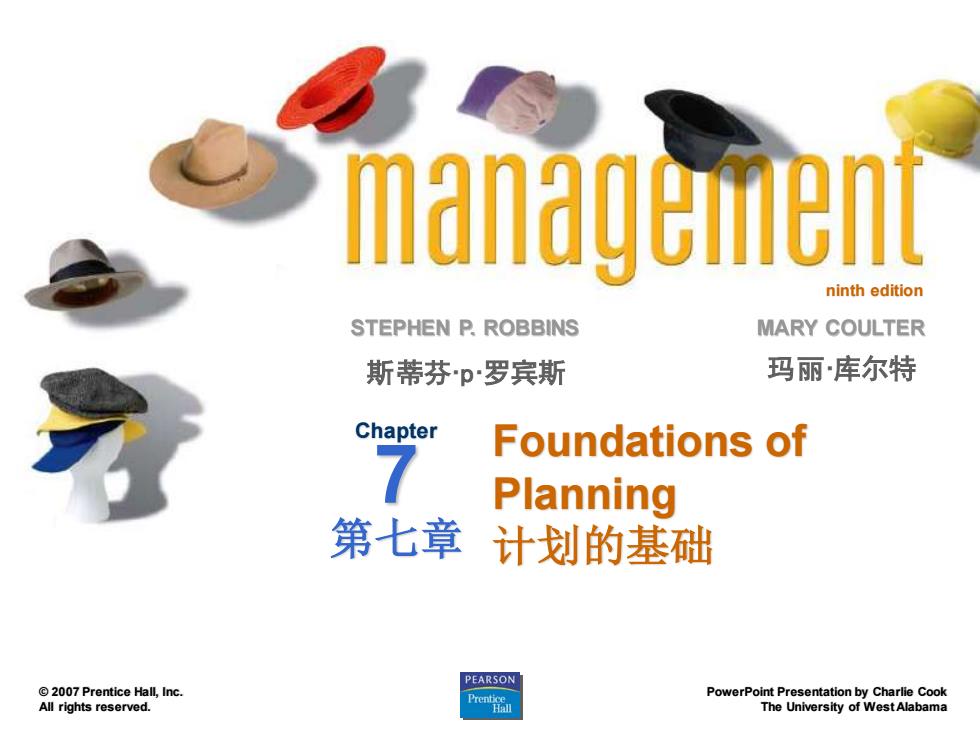
management ninth edition STEPHEN P.ROBBINS MARY COULTER 斯蒂芬p罗宾斯 玛丽库尔特 Chapter Foundations of 7 Planning 第七章 计划的基础 PEARSON 2007 Prentice Hall,Inc. PowerPoint Presentation by Charlie Cook All rights reserved. The University of WestAlabama
ninth edition STEPHEN P. ROBBINS PowerPoint Presentation by Charlie Cook The University of West Alabama MARY COULTER © 2007 Prentice Hall, Inc. All rights reserved. Foundations of Planning 计划的基础 Chapter 7 第七章 斯蒂芬·p·罗宾斯 玛丽·库尔特
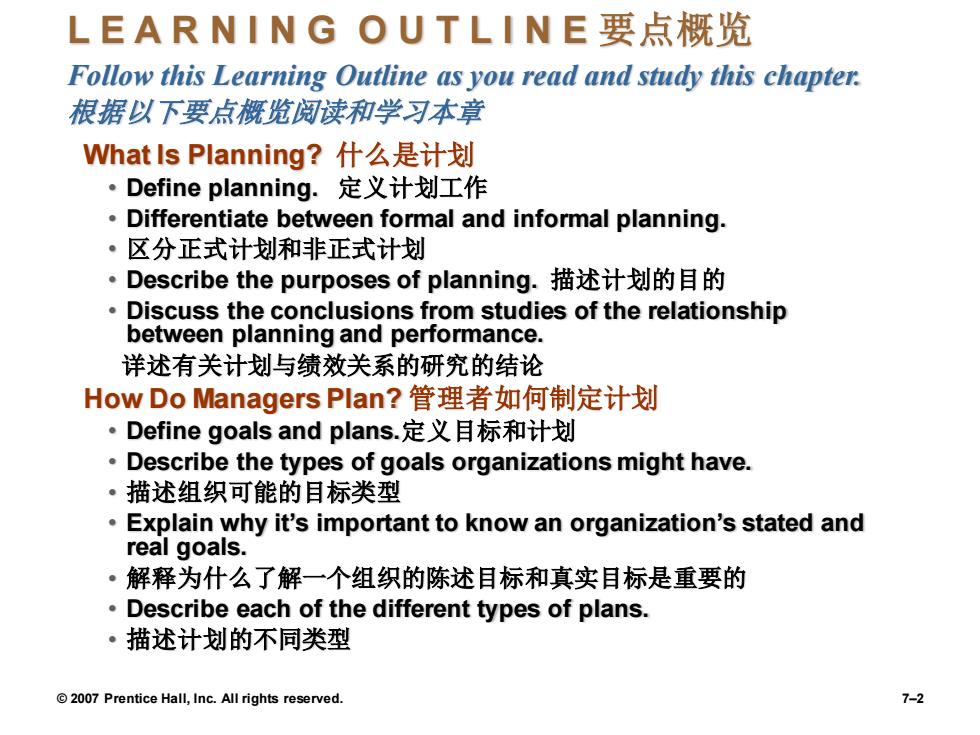
LEARNING OUTLINE要点概览 Follow this Learning Outline as you read and study this chapter. 根据以下要点概览阅读和学习本章 What Is Planning?什么是计划 ·Define planning.定义计划工作 Differentiate between formal and informal planning. 。 区分正式计划和非正式计划 ·Describe the purposes of planning.描述计划的目的 Discuss the conclusions from studies of the relationship between planning and performance. 详述有关计划与绩效关系的研究的结论 How Do Managers Plan?管理者如何制定计划 ·Define goals and plans.定义目标和计划 Describe the types of goals organizations might have. ·描述组织可能的目标类型 Explain why it's important to know an organization's stated and real goals. ·解释为什么了解一个组织的陈述目标和真实目标是重要的 Describe each of the different types of plans. ·描述计划的不同类型 2007 Prentice Hall,Inc.All rights reserved. 7-2
© 2007 Prentice Hall, Inc. All rights reserved. 7–2 L E A R N I N G O U T L I N E 要点概览 Follow this Learning Outline as you read and study this chapter. 根据以下要点概览阅读和学习本章 What Is Planning? 什么是计划 • Define planning. 定义计划工作 • Differentiate between formal and informal planning. • 区分正式计划和非正式计划 • Describe the purposes of planning. 描述计划的目的 • Discuss the conclusions from studies of the relationship between planning and performance. 详述有关计划与绩效关系的研究的结论 How Do Managers Plan? 管理者如何制定计划 • Define goals and plans.定义目标和计划 • Describe the types of goals organizations might have. • 描述组织可能的目标类型 • Explain why it’s important to know an organization’s stated and real goals. • 解释为什么了解一个组织的陈述目标和真实目标是重要的 • Describe each of the different types of plans. • 描述计划的不同类型
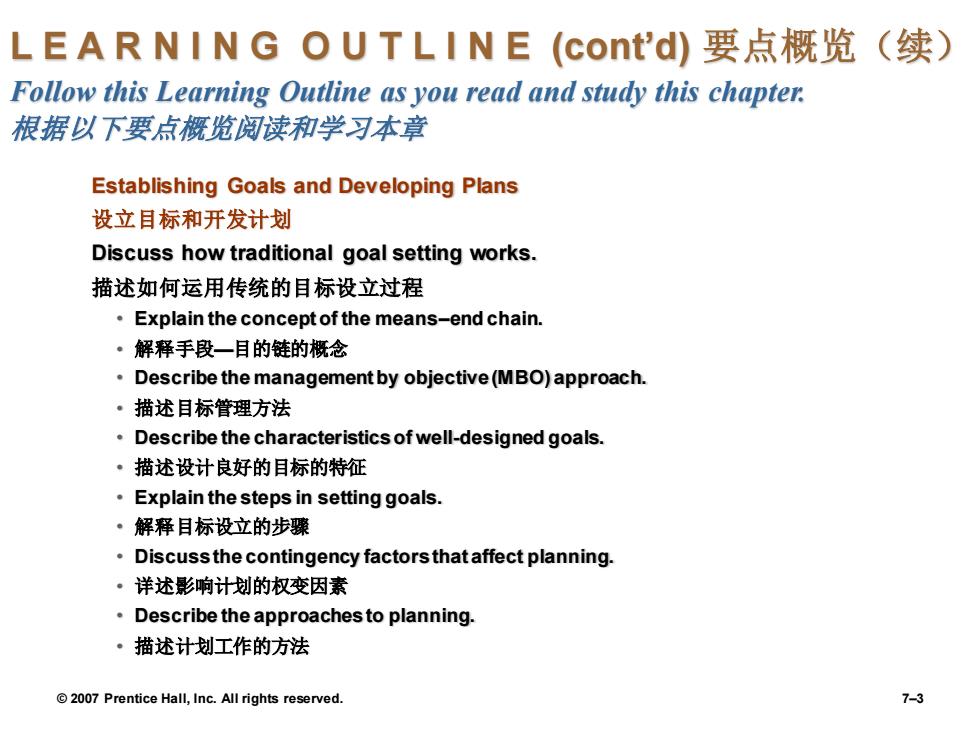
LEARNING OUTLINE(cont'd要点概览(续) Follow this Learning Outline as you read and study this chapter. 根据以下要点概览阅读和学习本章 Establishing Goals and Developing Plans 设立目标和开发计划 Discuss how traditional goal setting works. 描述如何运用传统的目标设立过程 。 Explain the concept of the means-end chain. ·解释手段一目的链的概念 Describe the management by objective(MBO)approach. ·描述目标管理方法 Describe the characteristics of well-designed goals. ·描述设计良好的目标的特征 Explain the steps in setting goals. ·解释目标设立的步骤 Discuss the contingency factorsthat affect planning. ·详述影响计划的权变因素 Describe the approaches to planning. 。描述计划工作的方法 2007 Prentice Hall,Inc.All rights reserved. 7-3
© 2007 Prentice Hall, Inc. All rights reserved. 7–3 L E A R N I N G O U T L I N E (cont’d) 要点概览(续) Follow this Learning Outline as you read and study this chapter. 根据以下要点概览阅读和学习本章 Establishing Goals and Developing Plans 设立目标和开发计划 Discuss how traditional goal setting works. 描述如何运用传统的目标设立过程 • Explain the concept of the means–end chain. • 解释手段—目的链的概念 • Describe the management by objective (MBO) approach. • 描述目标管理方法 • Describe the characteristics of well-designed goals. • 描述设计良好的目标的特征 • Explain the steps in setting goals. • 解释目标设立的步骤 • Discuss the contingency factors that affect planning. • 详述影响计划的权变因素 • Describe the approaches to planning. • 描述计划工作的方法
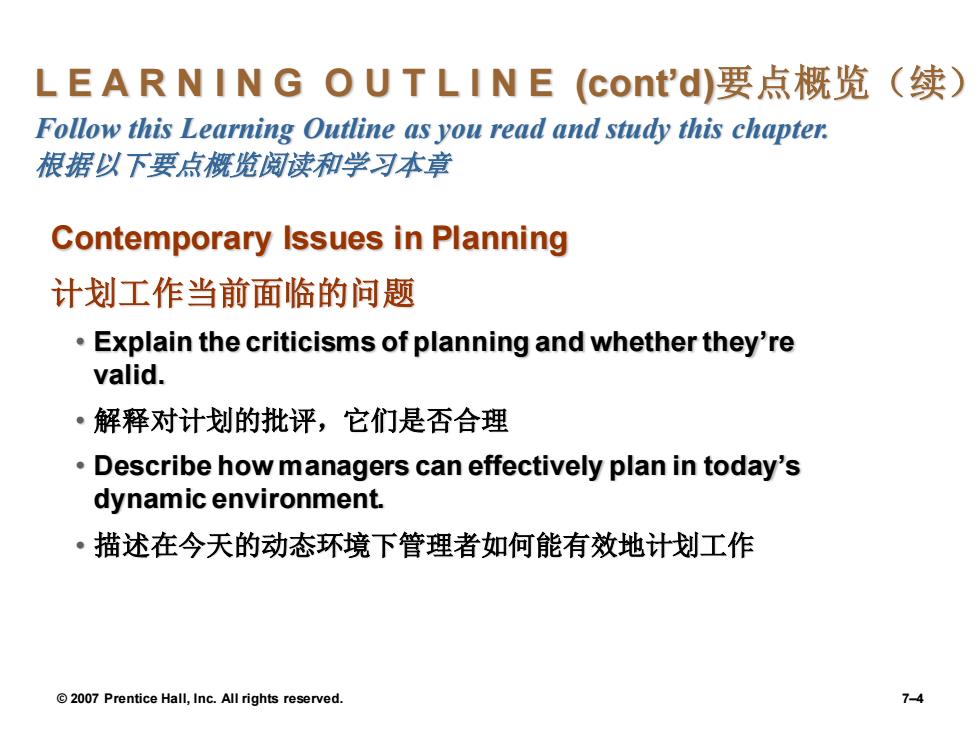
LEARNING OUTLINE(cont'd)要点概览(续) Follow this Learning Outline as you read and study this chapter. 根据以下要点概览阅读和学习本章 Contemporary Issues in Planning 计划工作当前面临的问题 Explain the criticisms of planning and whether they're valid. ·解释对计划的批评,它们是否合理 Describe how managers can effectively plan in today's dynamic environment. ·描述在今天的动态环境下管理者如何能有效地计划工作 2007 Prentice Hall,Inc.All rights reserved. 7-4
© 2007 Prentice Hall, Inc. All rights reserved. 7–4 L E A R N I N G O U T L I N E (cont’d)要点概览(续) Follow this Learning Outline as you read and study this chapter. 根据以下要点概览阅读和学习本章 Contemporary Issues in Planning 计划工作当前面临的问题 • Explain the criticisms of planning and whether they’re valid. • 解释对计划的批评,它们是否合理 • Describe how managers can effectively plan in today’s dynamic environment. • 描述在今天的动态环境下管理者如何能有效地计划工作
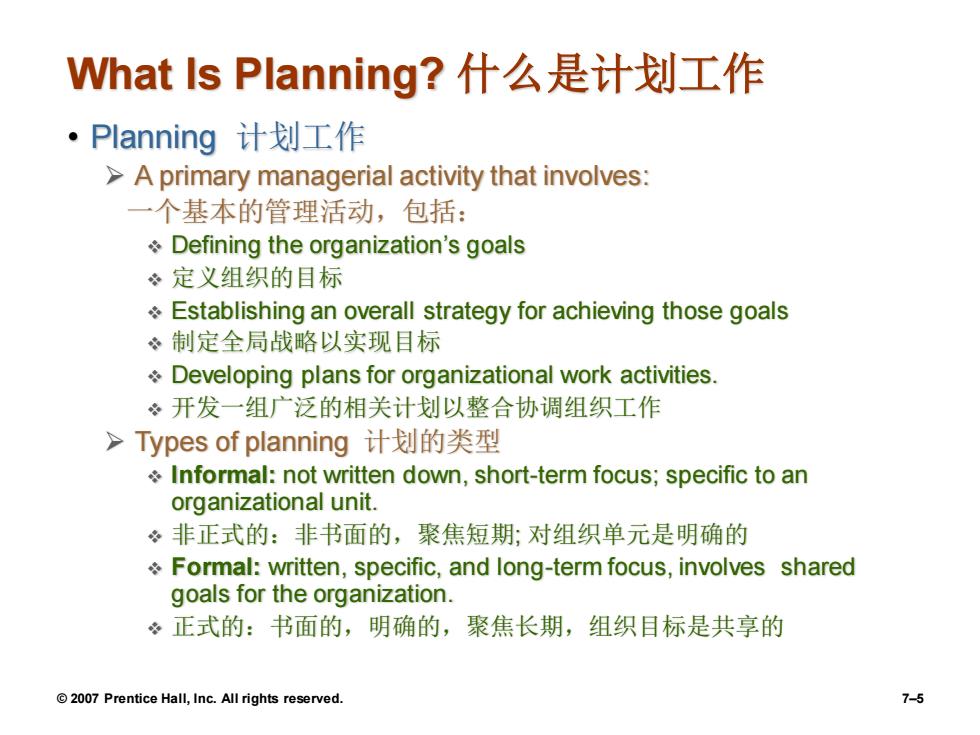
What Is Planning?什么是计划工作 ·Planning计划工作 >A primary managerial activity that involves: 一个基本的管理活动,包括: Defining the organization's goals 冬定义组织的目标 Establishing an overall strategy for achieving those goals 冬制定全局战略以实现目标 Developing plans for organizational work activities ·开发一组广泛的相关计划以整合协调组织工作 >Types of planning计划的类型 Informal:not written down,short-term focus;specific to an organizational unit. 。非正式的:非书面的,聚焦短期;对组织单元是明确的 Formal:written,specific,and long-term focus,involves shared goals for the organization. ÷正式的:书面的,明确的,聚焦长期,组织目标是共享的 2007 Prentice Hall,Inc.All rights reserved. 7-5
© 2007 Prentice Hall, Inc. All rights reserved. 7–5 What Is Planning? 什么是计划工作 • Planning 计划工作 ➢ A primary managerial activity that involves: 一个基本的管理活动,包括: ❖ Defining the organization’s goals ❖ 定义组织的目标 ❖ Establishing an overall strategy for achieving those goals ❖ 制定全局战略以实现目标 ❖ Developing plans for organizational work activities. ❖ 开发一组广泛的相关计划以整合协调组织工作 ➢ Types of planning 计划的类型 ❖ Informal: not written down, short-term focus; specific to an organizational unit. ❖ 非正式的:非书面的,聚焦短期; 对组织单元是明确的 ❖ Formal: written, specific, and long-term focus, involves shared goals for the organization. ❖ 正式的:书面的,明确的,聚焦长期,组织目标是共享的
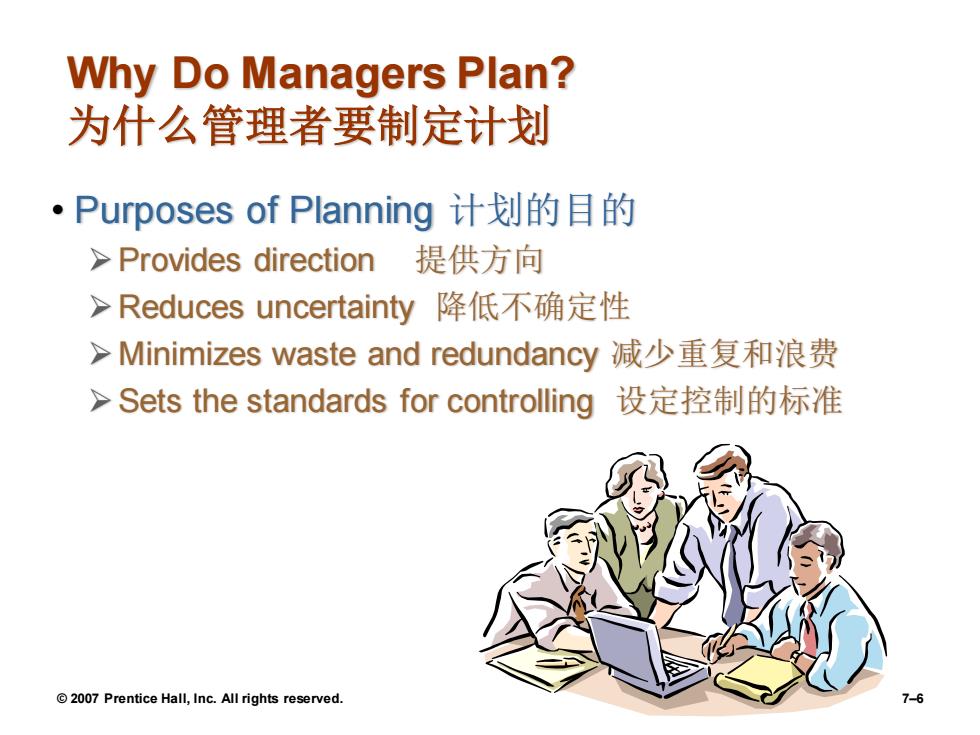
Why Do Managers Plan? 为什么管理者要制定计划 ·Purposes of Planning计划的目的 >Provides direction 。提供方向 >Reduces uncertainty降低不确定性 >Minimizes waste and redundancy减少重复和浪费 >Sets the standards for controlling 设定控制的标准 2007 Prentice Hall,Inc.All rights reserved. 7
© 2007 Prentice Hall, Inc. All rights reserved. 7–6 Why Do Managers Plan? 为什么管理者要制定计划 • Purposes of Planning 计划的目的 ➢Provides direction 提供方向 ➢Reduces uncertainty 降低不确定性 ➢ Minimizes waste and redundancy 减少重复和浪费 ➢Sets the standards for controlling 设定控制的标准

Planning and Performance计划和绩效 The Relationship Between Planning And Performancei 划与绩效间的关系 Formal planning is associated with: >正式的计划工作可以带来: Higher profits and returns on assets.较高的收益与资产回报率 冬Positive financial results.积极的财务结果 The quality of planning and implementation affects performance more than the extent of planning. 计划工作的质量以及实现计划的适当措施,通常比计划工作的范 自对绩效的资厭更 The external environment can reduce the impact of planning on performance, >外部环境会削弱计划工作对组织绩效的影响 Formal planning must be used for several years before planning begins to affect performance. >正式的计划工作对组织绩效开始产生影响需要几年的适应时间。 2007 Prentice Hall,Inc.All rights reserved. 7-7
© 2007 Prentice Hall, Inc. All rights reserved. 7–7 Planning and Performance 计划和绩效 • The Relationship Between Planning And Performance 计 划与绩效间的关系 ➢ Formal planning is associated with: ➢ 正式的计划工作可以带来: ❖ Higher profits and returns on assets. 较高的收益与资产回报率 ❖ Positive financial results. 积极的财务结果 ➢ The quality of planning and implementation affects performance more than the extent of planning. ➢ 计划工作的质量以及实现计划的适当措施,通常比计划工作的范 围对绩效的贡献更大 ➢ The external environment can reduce the impact of planning on performance, ➢ 外部环境会削弱计划工作对组织绩效的影响 ➢ Formal planning must be used for several years before planning begins to affect performance. ➢ 正式的计划工作对组织绩效开始产生影响需要几年的适应时间

How Do Managers Plan?管理者如何制定计划 ·Elements of Planning计划工作的组成要素 >Goals(also Objectives)目标(也称为目的) Desired outcomes for individuals,groups,or entire organizations ÷是个体、群体和整个组织期望的产出。 Provide direction and evaluation performance criteria 。提供决策方向,构成衡量标准 >Plans计划 Documents that outline how goals are to be accomplished 。描述了需要完成的大概目标 Describe how resources are to be allocated and establish activity schedules 。描述资源的分配、设定行动进度。 2007 Prentice Hall,Inc.All rights reserved. 7-8
© 2007 Prentice Hall, Inc. All rights reserved. 7–8 How Do Managers Plan? 管理者如何制定计划 • Elements of Planning 计划工作的组成要素 ➢ Goals (also Objectives) 目标(也称为目的) ❖ Desired outcomes for individuals, groups, or entire organizations ❖ 是个体、群体和整个组织期望的产出。 ❖ Provide direction and evaluation performance criteria ❖ 提供决策方向,构成衡量标准 ➢ Plans 计划 ❖ Documents that outline how goals are to be accomplished ❖ 描述了需要完成的大概目标 ❖ Describe how resources are to be allocated and establish activity schedules ❖ 描述资源的分配、设定行动进度
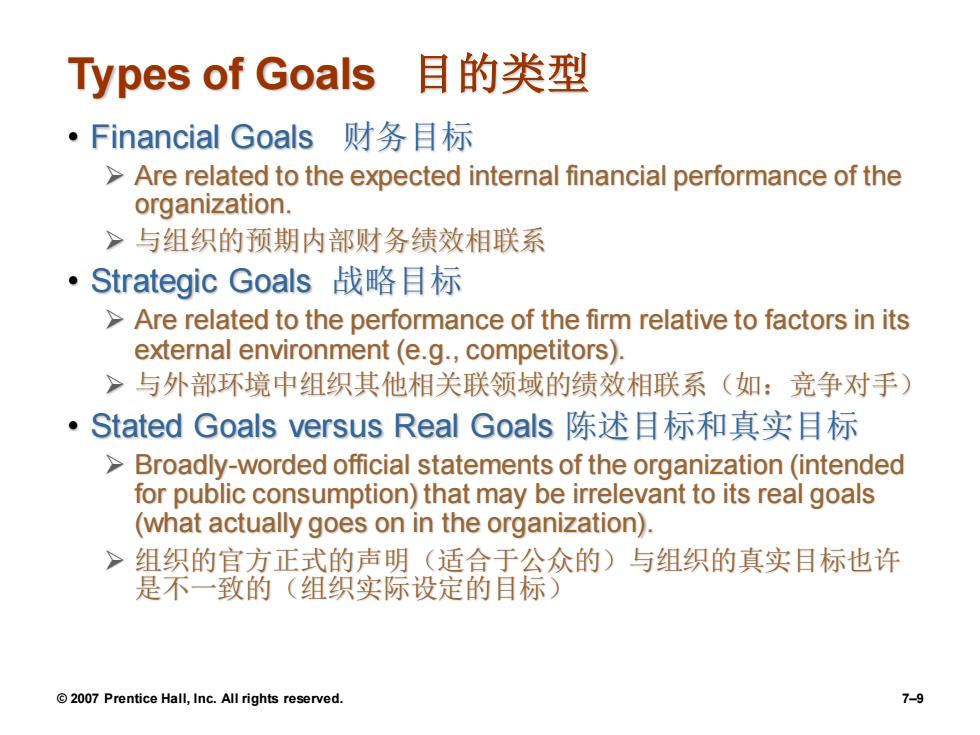
Types of Goals 目的类型 ·Financial Goals财务目标 >Are related to the expected internal financial performance of the organization. >与组织的预期内部财务绩效相联系 ·Strategic Goals战略目标 >Are related to the performance of the firm relative to factors in its external environment(e.g.,competitors). >与外部环境中组织其他相关联领域的绩效相联系(如:竞争对手) ·Stated Goals versus Real Goals陈述目标和真实目标 Broadly-worded official statements of the organization (intended for public consumption)that may be irrelevant to its real goals (what actually goes on in the organization). >组织的官方正式的声明(适合于公众的)与组织的真实目标也许 是不一致的(组织实际设定的目标) 2007 Prentice Hall,Inc.All rights reserved. 7-9
© 2007 Prentice Hall, Inc. All rights reserved. 7–9 Types of Goals 目的类型 • Financial Goals 财务目标 ➢ Are related to the expected internal financial performance of the organization. ➢ 与组织的预期内部财务绩效相联系 • Strategic Goals 战略目标 ➢ Are related to the performance of the firm relative to factors in its external environment (e.g., competitors). ➢ 与外部环境中组织其他相关联领域的绩效相联系(如:竞争对手) • Stated Goals versus Real Goals 陈述目标和真实目标 ➢ Broadly-worded official statements of the organization (intended for public consumption) that may be irrelevant to its real goals (what actually goes on in the organization). ➢ 组织的官方正式的声明(适合于公众的)与组织的真实目标也许 是不一致的(组织实际设定的目标)
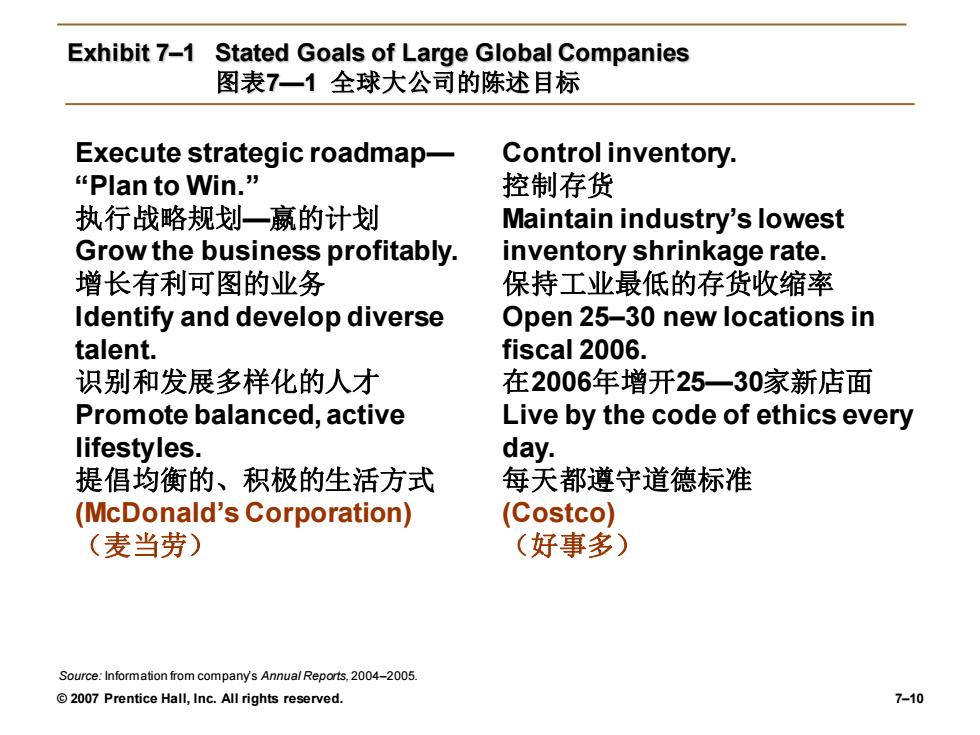
Exhibit 7-1 Stated Goals of Large Global Companies 图表7一1全球大公司的陈述目标 Execute strategic roadmap- Control inventory. “Plan to Win.” 控制存货 执行战略规划一赢的计划 Maintain industry's lowest Grow the business profitably. inventory shrinkage rate. 增长有利可图的业务 保持工业最低的存货收缩率 Identify and develop diverse Open 25-30 new locations in talent. fiscal 2006 识别和发展多样化的人才 在2006年增开25一30家新店面 Promote balanced,active Live by the code of ethics every lifestyles. day. 提倡均衡的、积极的生活方式 每天都遵守道德标准 (McDonald's Corporation) (Costco) (麦当劳) (好事多) Source:Information from companys AnnualReports,2004-2005. 2007 Prentice Hall,Inc.All rights reserved. 7-10
© 2007 Prentice Hall, Inc. All rights reserved. 7–10 Exhibit 7–1 Stated Goals of Large Global Companies 图表7—1 全球大公司的陈述目标 Execute strategic roadmap— “Plan to Win.” 执行战略规划—嬴的计划 Grow the business profitably. 增长有利可图的业务 Identify and develop diverse talent. 识别和发展多样化的人才 Promote balanced, active lifestyles. 提倡均衡的、积极的生活方式 (McDonald’s Corporation) (麦当劳) Control inventory. 控制存货 Maintain industry’s lowest inventory shrinkage rate. 保持工业最低的存货收缩率 Open 25–30 new locations in fiscal 2006. 在2006年增开25—30家新店面 Live by the code of ethics every day. 每天都遵守道德标准 (Costco) (好事多) Source: Information from company’s Annual Reports, 2004–2005